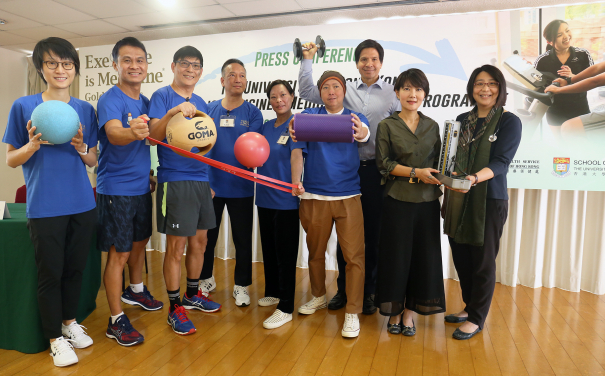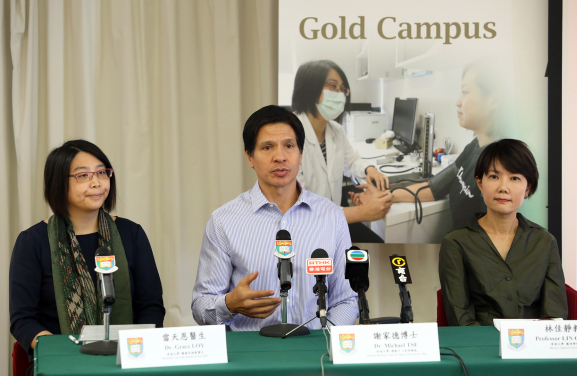Media
HKU takes the lead in launching Exercise is Medicine medical referral
programme for patients including those recovering from cancer
07 Nov 2018

From right: Dr Grace Loy, Professor Lin Chia-chin and Dr Michael Tse with six patients who took part in the 12-week pilot intervention programme.
Insufficient physical activity has been shown to be responsible for a staggering 5% of the deaths that occur worldwide and ranks 4th among the World Health Organization’s top 10 causes of death. It is a key risk factor for many non-communicable diseases (NCDs) such as cancer, diabetes and cardiovascular diseases. However, while most medical professionals around the world do acknowledge the importance of being physically active for better health, many are reluctant to refer patients to general fitness gyms or trainers.
The University Health Services (UHS) and the Centre for Sports and Exercise (CSE) at the University of Hong Kong have taken the lead among local universities in launching an Exercise is Medicine medical referral programme, where patients in need of more exercise opportunities could be appropriately referred to the professional care and supervision that they need.
Under the programme, patients visiting the UHS clinic are asked a number of simple questions related to the frequency and intensity of their physical activity habits. Those who are generally healthy, but present with insufficient physical activity are provided with information about proper exercise habits and opportunities on campus. For more serious cases the medical doctor may refer patients to exercise specialists at CSE, who are experienced in providing exercise and consultation to various special populations including those with diabetes, cancers, frailty and muscle loss or those with orthopedic problems, which may affect their ability to be active.
HKU is the first university in Hong Kong, and among the first two universities in Asia, alongside Osaka Sangyo University in Japan, to be awarded the prestigious Gold Level Campus recognition under the Exercise is Medicine® on Campus (EIM-OC) Recognition Programme of the American College of Sports Medicine in 2018. The programme aims to make exercise a part of daily campus culture in universities and to have exercise be addressed as a vital sign in the universities health care system.
As part of the team bringing Exercise is Medicine® on campus to HKU, UHS Director Dr Cheung Man-Kuen points out that, “As medical professionals we are aware of the need for patients to be active. Having a systematic approach that can give our doctors confidence to refer patients for exercise is the key to a good medical-to-exercise referral strategy”.
Dr Michael Tse, Assistant Director of CSE, stresses the importance of a teamwork approach in making exercise referral successful. “Working in close cooperation with UHS professionals provides the ideal pathway for patients.” He added, “While our exercise specialists may have the tools and skills to implement exercise with many special needs groups, those in most need of engaging in physical activity may remain hidden. The value of a discussion with a medical doctor about the high risks to their health of being inactive carries the most impact with patients”.
According to the Population Health Survey by the Department of Health (2014-15), around 27% of the population aged 15 or above in Hong Kong had increased blood pressure. In 2017-18, the Centre for Sports and Exercise (CSE) at HKU placed a Health Assessment Station in the HKU campus to conduct fitness assessments for about 250 staff and found that 37% of the participants showed elevated blood pressure, with 34% of those assessed showing to be overweight or obese in comparison to the Hong Kong norm of 28%. Separately, in 2018, the University Health Services (UHS) conducted an on-campus health assessment for about 400 students and staff who chose to take part. They found that over 30% showed elevated blood pressure, 19% were overweight or obese and 44% showed elevated cholesterol. More alarmingly, 60% were considered physically inactive (less than 2 days per week of 30-minute exercise).
Medical doctors are often reluctant to refer patients to general fitness gyms, where exercise trainers may not be qualified or experienced to handle patients with special conditions. CSE has earned the confidence of UHS due to a good track record in handling referred patients and also carrying out exercise trials and interventions for numerous special populations including cancer patients, diabetics, cardiovascular disease, dementia, frailty, among others.
From July –September 2018, CSE and the HKU School of Nursing also jointly carried out a 12-week pilot intervention programme to look at the benefits of exercise in 20 lung cancer patients. The findings revealed that exercise led to significant improvements in physical function, energy levels, psychosocial function, sleep quality and overall quality of life. In terms of physical fitness, patients demonstrated significant improvements in muscular strength, flexibility, functional capacity (i.e., cardiovascular capacity) and body composition. Socially, exercise programmes provided a positive social platform for patients to share treatment information and to facilitate peer-support along their rehabilitation journey.
Feedback from participants revealed the need for tailor-made exercise training programmes in the local community and the need to promote exercise “as a medicine”, particularly for treatments of certain cancers during rehabilitation stages. Professor Lin Chia-chin, Director of the School of Nursing, described the positive changes in patients as encouraging. She said, “I have carried out numerous studies in Taiwan with lung cancer patients. Our current pilot study in Hong Kong adds to the body of evidence that patients with lung cancer can experience improvements in quality of life by engaging in exercise. The results of the pilot study were positive and we are planning a larger-scale intervention to be conducted in the future”.
Most cancer patients indicate a willingness to try almost any kind of exercise, but they admit that they are reluctant to start on their own due to lack of knowledge. Due to the good feedback and outcomes, Exercise for Lung Cancer Patients has been opened as a new medical referral pathway service at HKU.
Media enquiries:
Centre for Sports and Exercise:
Dr. Michael Tse (Tel: 2817 3835/ Email: matse@hku.hk)
Communication and Public Affairs Office:
Ms Trinni Choy (Tel: 2859 2606/ Email: pychoy@hku.hk)
Ms Rashida Suffiad (Tel: 2857 8555/ Email: rsuffiad@hku.hk)

